| Srl | Item |
| 1 |
ID:
183354
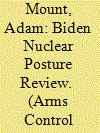

|
|
|
|
|
| Summary/Abstract |
President Joe Biden entered office with two objectives for nuclear weapons policy: declaring that “the sole purpose of our nuclear arsenal should be to deter—and, if necessary, retaliate against—a nuclear attack” and implementing the sole purpose policy as part of a broader effort to reduce the role of nuclear weapons. Although Biden has not clearly defined either goal, his support for both has signaled an intention to produce a significant shift in U.S. nuclear weapons policy. Public hints about the structure and the content of his administration’s Nuclear Posture Review (NPR) suggest, however, that Biden will not achieve his goal of reducing reliance on nuclear weapons in U.S. plans and posture.
|
|
|
|
|
|
|
|
|
|
|
|
|
|
|
|
| 2 |
ID:
140981
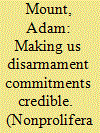

|
|
|
|
|
| Summary/Abstract |
President Barack Obama's 2009 commitment to pursue a world without nuclear weapons struck some as incredible given political resistance to arms control treaties and unilateral reductions. This viewpoint describes steps that can demonstrate a commitment to nuclear disarmament that do not rely on warhead dismantlement. These steps include the collation and release of nuclear data; the renovation and construction of facilities to new transparency standards; and the selective modification of conventional weapon systems. The steps may make a disarmament agreement more likely by assuaging the difficulty the United States will have committing to a verification scheme, given its capacity to circumvent such a scheme. A more credible disarmament pledge could also secure substantial fiscal and diplomatic gains.
|
|
|
|
|
|
|
|
|
|
|
|
|
|
|
|
| 3 |
ID:
131604
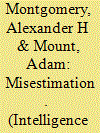

|
|
|
|
|
| Publication |
2014.
|
| Summary/Abstract |
Various policy options have been proposed for slowing or halting the spread of nuclear weapons, yet all rely on sound intelligence about the progress of nuclear aspirants. Historically, the United States' record of estimating foreign weapons programs has been uneven, overestimating the progress made by some proliferators while underestimating others. This paper seeks to catalogue and evaluate the intelligence work surrounding 16 of the 25 states that are thought to have pursued nuclear weapons and to provide a framework for evaluating the causes of distorted intelligence estimates of nuclear proliferation. In particular, we identify 12 specific hypotheses related to politics, culture, bureaucracy and organizational culture, then explore how they play out in practice through two case studies (North Korea and Israel). We find that the US has overestimated nuclear programs much more frequently than it has underestimated or correctly estimated them.
|
|
|
|
|
|
|
|
|
|
|
|
|
|
|
|
| 4 |
ID:
170575
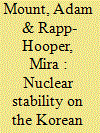

|
|
|
|
|
| Summary/Abstract |
he US and South Korea must afford Pyongyang a rational expectation of security but no hope of winning a limited conflict.
|
|
|
|
|
|
|
|
|
|
|
|
|
|
|
|
| 5 |
ID:
141128
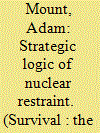

|
|
|
|
|
| Summary/Abstract |
It is manifestly in the American interest that nuclear weapons are never again used in war – but if they are, should the United States retaliate in kind? In many ways, US nuclear policy still labours in the shadow of Cold War deterrence models, yet a new concept of nuclear escalation is coming to dominate strategic planning. Today, there is little risk of a massive, disarming strike of the sort that kept Cold War presidents awake in the night. Instead, strategists worry that a regional adversary could use a nuclear weapon in an attempt to offset US conventional superiority and truncate an escalating conflict on favourable terms. This concept of nuclear use, referred to here as ‘offset escalation’, not only makes it more difficult to manage crises with regional nuclear powers, but also changes how strategists should think about what to do if deterrence fails.
|
|
|
|
|
|
|
|
|
|
|
|
|
|
|
|
| 6 |
ID:
075399


|
|
|
|
|
| Publication |
2006.
|
| Summary/Abstract |
The article surveys the responses to the European Security and Defence Policy (ESDP) of two important external actors: the United States and Russia. It explains the motivations behind these responses and the effect of the latter on the development of the ESDP. The survey finds that both the Clinton and the Bush administrations in the USA have expressed cautious support for the initiative while insisting on NATO's salience in Europe. Russia's enthusiasm for the project is an effort to ensure its participation in European and global security affairs. The conclusion of the article briefly explores the implications of the empirical observations in the light of the future development of the ESDP.
|
|
|
|
|
|
|
|
|
|
|
|
|
|
|
|
| 7 |
ID:
192145
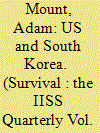

|
|
|
|
|
| Summary/Abstract |
As US officials have grown more anxious about the credibility of extended nuclear deterrence, they have placed renewed emphasis on nuclear-assurance measures. The hope is that closer exercises and consultations can reassure allies, strengthen deterrence postures and reduce the risk that an ally could pursue their own nuclear weapons. However, recent developments in the US–South Korea alliance suggest that nuclear assurance is not only ineffective at reassuring Seoul but may also be fuelling proliferation risks. By raising the salience of nuclear weapons within the alliance, nuclear assurance reinforces the fiction that South Korea’s defence depends on nuclear use. Misunderstanding the risks and potential of nuclear assurance has fuelled calls for a South Korean nuclear-weapons programme and obstructed the alliance’s ability to adapt and improve its deterrence posture.
|
|
|
|
|
|
|
|
|
|
|
|
|
|
|
|